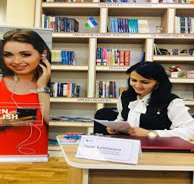My name is Mukaddam Ibrokhimova. I am an EFL teacher at Namangan State University, Uzbekistan.
My research interest for this project was to identify how to motivate reluctant low proficiency level students to participate in group work activities in a multilevel context.
Abstract of my classroom-based research
Student demotivation and their reluctance, particularly, during speaking activities, have been an unpleasant challenge for many EFL and ESL teachers most of the time. This chapter explores some speaking related challenges such as students’ unwillingness to participate in group work activities, the factors which keep them from speaking, as language level diversity, lack of vocabulary, lack of confidence, fear from being mocked because of their errors. This is done by analyzing teacher self and peer observations and surveys of 17 students in one of my classes at Namangan State University, Teaching English Methodology department. Through thematic analyzes and taking some actions, several effective strategies were found to overcome the mentioned challenges. This chapter concludes with the coping approaches and the areas which need to be discussed for further research.
Reflections on the training and exploratory action research
Every teacher is more likely to come across various challenges in the classroom which lead to teacher and student demotivation. Obviously, student and teacher demotivation results in ineffective lessons. Like most other teachers I also have undergone those ups and downs during my teaching experience. However, NETRUZ Exploratory Action Research Project was a huge help to make us capable of exploring our classes, analyzing and identifying the root problems and finding effective solutions.
In my classes, I used to do some investigations when I had problems with my own teaching or with my students but it wouldn’t end up with success most of the time, as my research was not disciplined and had no methodology. I realized this, only after participating Exploratory Action Research Project organized by the NETRUZ team. It helped me how to conduct classroom research properly, step by step. Learning about data collecting tools and how to analyze the gathered information assisted me to find out the major reasons for the problems in my class. And in the next stage, I used my knowledge on how to take action which I was taught in the project. Seeing positive changes in my classroom made me excited and motivated to do further classroom-based research.
Those above are not the only thing I got from the project, it also helped me to write a professional research paper! Furthermore, I’m planning to use my takeaways from this project in research related courses! In conclusion, being a part of Exploratory Action Research was a priceless experience for me which has made me more professional in my field!









